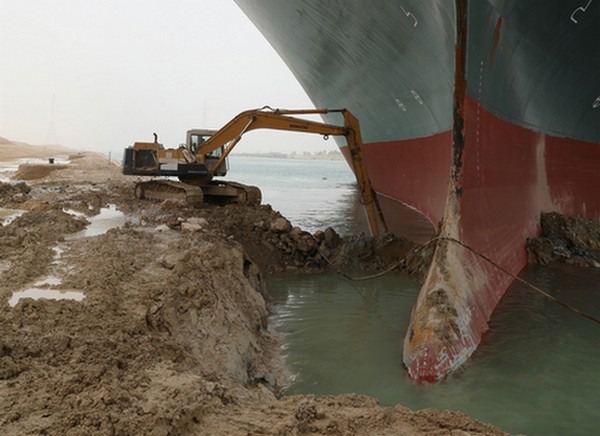The resumed passage through the Suez Canal has the maritime cargo industry bracing for the next phase of the crisis – a race to ports around the world. Data from supply chain visibility company project44 indicates that consumer goods will be delayed as the canal incident creates worsening congestion at ports.
Project44 has published cargo data and route information that highlights where the post-Suez competition for docking capacity will be the most intense. Ports including Jeddah, Rotterdam, and Singapore are likely to be overwhelmed.
Vessel data released by project44 details the retail value of the cargo stuck in transit, currently at over $83 billion. With reroutes further complicating scheduling, boats currently making their way around Africa will soon join the competition for limited discharging capacity at ports where supply chain breakdowns will take place in the weeks ahead.
 © Suezcanal.gov.eg
© Suezcanal.gov.eg
Image: Suezcanal.gov.eg
“Just because your cargo is moving again doesn’t mean you can breathe easy,” said Josh Brazil, VP of Ocean Freight Operation at project44. “Understanding and monitoring port congestion over the next few weeks will inform us about how large the shockwaves from this incident are going to be. As this saga unfolds, it will take on increasingly global proportions.”
Although Egyptian officials say the backlog of ships waiting to transit through should be cleared in around three days, experts believe the knock-on effect on global shipping could take weeks or even months to resolve. Because now, the authorities will have to address another challenge - congestion. The head of the Suez Canal Authority said that hundreds of stranded vessels would be allowed through the canal on a first-come-first-served basis. The BBC reported that there might be some exceptions to specific ships, based on the types of goods on board.
According to experts at Maersk, the world's biggest shipping company, the Suez Canal blockage has caused shipping backlogs that could take months to unwind. In a statement, Maersk said: "Even when the canal gets reopened, the ripple effects on global capacity and equipment are significant and the blockage has already triggered a series of further disruptions and backlogs in global shipping that could take weeks, possibly months, to unravel.”
Maersk added that it had three ships stuck in the Suez Canal and 29 ships waiting to enter the canal. It has already redirected 15 ships around the southern tip of South Africa, which adds about 10 days to their journeys.
Maersk told Insider that it was "still too early to indicate the total business impact of the six days blockage" but that the company was "working around the clock to mitigate the delays."
According to Soren Skou, CEO of Maersk, the Suez Canal jam, coupled with the current pandemic, had forced companies to rethink their supply chains. Skou said businesses previously depended on "just in time" supply chains, whereby items were transported to factories only as they were needed for manufacturing.
Please find attached the latest reports from project44 detailing impending port congestion, and other data cited in this press release.










